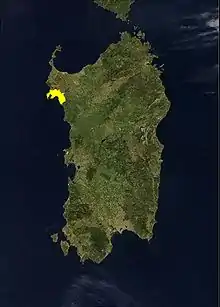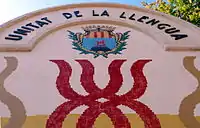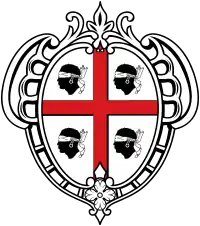Algherese dialect
Algherese (Standard Catalan: alguerès, pronounced [əlɣəˈɾɛs]; Algherese: alguerés [alɣaˈɾes]) is the variant of old Catalan spoken in the city of Alghero (L'Alguer in Catalan), in the northwest of Sardinia, Italy.
| Algherese | |
|---|---|
| alguerés | |
Native speakers | 7,480 (2008) |
| Language codes | |
| ISO 639-3 | – |
| Glottolog | algh1238 |
| ELP | Algherese Catalan[1] |
 A satellite photo of the island of Sardinia with the location of the Algherese-speaking area being marked in yellow. | |
The dialect has its roots in 1372, when Catalan-speaking colonists were allowed to repopulate the town and expel the native population, after several revolts.[2]
Catalan was replaced as the official language by Spanish, then by Italian in the mid-18th century. Despite the city's increasing Italianization, the use of this Catalan dialect remained widespread until at least the 1970s.[3] Today it has semi-official status alongside Italian.[4]
Based on additional linguistic studies, there are approximately 20,000 to 30,000 native speakers of the language worldwide. In communities where Algherese is spoken, Italian and Logudorese Sardinian are often used as well.[5]
History
| Catalan language |
|---|
| Overview |
| Dialects |
| Grammar |
| Organizations |
Algherese is a regional dialect spoken by anywhere from 20,000 to 30,000 individuals, most of which reside in the town of Alghero, located in the northwest of Sardinia.[5] The language, though distinct is initially derived from, and thus considered a variant of, the Catalan language.[5] The origins of the language can be traced back to 1372, when Catalan invaders repopulated the city of Alghero after exiling the indigenous populations in Sardinia.[5]
Geographic distribution
As a result of the city's extensive Italianization, Italian is now the predominant language in Alghero, being estimated by a 2004 survey to be first language of close to 60% of the interviewees.[6] The use of the dialect in schools and media, to name a few, remains sparse. Teaching of the dialect in school is also rare. However, in an attempt to reverse the trend, the Regional Council of Sardinia officially recognized "Algherese Catalan" as a separate language in 1997, in order to promote its use and circulation.[6] As of a 2008 study, Algherese was used by approximately 14% of the population for daily interactions.[6] The dialect is mostly a local language, often used to supplement Italian and/or Sardinian in relatively small circles.[7]
Official status
In the northwest region of Sardinia, where this language is spoken, Italian is the primary language. Algherese Catalan acts as a secondary language in the overall region.
In 1999, Catalan and Sardinian were among the twelve minority languages officially recognized as Italy's "historical linguistic minorities" by the Italian State under law no. 482/1999.[8] Prior to this, the Regional Council of Sardinia had passed the regional law n. 26 of 15 October 1997 which, aside from promoting the equality in dignity of the Sardinian language with the Italian language throughout the island, provided that the other languages of smaller scope be afforded the same treatment as the aforementioned languages, among which Catalan is cited, in the city of Alghero.[9] The city council, for its part, promulgated its protection and standardization in its city statute.[10]
Usage
The following figures were obtained from the Enquesta d’usos lingüístics a l’Alguer ("Survey of linguistic usage in Alghero", EULAL) of 2004[11] and the "Els usos lingüístics a l’Alguer" of 2015 (EULA 2015),[12] both of which were studies conducted in the town of Alghero about the general use of Algherese in several media.
| 2004 | 2015 | |
|---|---|---|
| Oral Comprehension | 90.1% (Sardinian oral comprehension: 69.7%) | 88.2% |
| Oral Expression | 61.3% (Sardinian oral expression: 33.9%) | 50.5% |
| Written Comprehension | 46.6% (Sardinian written comprehension: 35.4%) | 35.6% |
| Written Expression | 13.6% (Sardinian written expression: 15.4%) | 8.1% |
| First Language | 22.4% (59.2% Italian) | 17.5% |
| Habitual Language | 13.9% | 9.1% |
Phonology
- Like in other languages of Sardinia /ɛ/ and /e/ as well as /ɔ/ and /o/ may merge into mid vowels [e̞] and [o̞], respectively.
- Coalescing of unstressed vowels /a/, /ɛ/ and /e/ to [a] (unlike the rest of Eastern Catalan, which uses [ə]).
- Algherese preserves /v/ as a distinct phoneme from /b/, like Balearic and most of Valencian.
- Mutation of intervocalic /d/ or /l/ to [r]: 'Barceloneta' (little Barcelona): Eastern Standard [bərsəɫuˈnɛtə], Algherese [balsaruˈne̞ta]; and vila ('town') and vida ('life') are homophones in Algherese [ˈvira].
- Mutation of syllable final /r/ to lateral [l], and the possible resulting group /r/ + consonant is further simplified to [l]: forn ('furnace, oven'): Standard [ˈfo̞rn], Algherese [ˈfo̞l].
- Depalatalization of syllable final sonorants: lateral /ʎ/ to [l], nasal /ɲ/ to [n]; e.g. any ('year'): Standard [ˈaɲ], Algherese [ˈan].
- Unlike most Catalan dialects, /l/ is never velarized in Algherese: sol ('sun'): Standard [ˈsɔɫ], Algherese [ˈso̞l].
Morphology
- The simple past is replaced by the present perfect (present of haver "to have" + past participle), possibly by Italian influence.
- The imperfect past preserves etymological -v- in all conjugations: 1st -ava, 2nd -iva, 3rd -iva (unlike modern Eastern and Western Standard Catalan, which use 1st -ava, 2nd -ia, 3rd -ia, a feature shared with the Ribagorçan dialect.
- Large-scale lexical borrowing and calques from Sardinian, Spanish and Italian: nearly half of the vocabulary is not from Catalan.[13]
Differences from Standard Catalan
The Algherese variant is Eastern Catalan, but it has many differences from Central Catalan, with some of the most obvious ones as follows:
Vocabulary
The following abbreviations are used: m (masculine), f (feminine), pl (plural), fpl (feminine plural), inf (informal), f (formal).
The following phrases were gathered from a Catalan translation set, but the common phrases in Algherese are similar:[14]
| English | Catalan | Algherese |
|---|---|---|
| Welcome | Benvingut (m)
Benvinguda (f) Benvinguts (pl) Benvingudes (fpl) |
Benvingut (m)
Benvinguda (f) Benvinguts (pl) Benvingudes (fpl) |
| Hello | Hola
Bon dia |
Txao
Bon dia |
| My name is ... | Em dic ... | Me aquirr ...
Me dic ... |
| Where are you from? | D'on ets? (inf)
D'on és vostè? (f) |
De ont ses? (inf)
De ont és vostè? (f) |
| Good morning | Bon dia | Bon dia |
Literature


The Premi Rafael Sari, organised by the Obra Cultural de l'Alguer,[15] is a series of prizes awarded in September each year to the best literary works of poetry and prose written in Alguerese Catalan.
Notable poets include Rafael Sari, Pasquale Scanu and Maria Chessa Lai. There is also a long tradition of writing and performing songs in Alguerese Catalan and the Premio Pino Piras[16] is awarded for new songs written in the language. Notable singer-songwriters include Pino Piras and Franca Masu.
In 2015 Carla Valentino published an Algherese translation of Antoine de Saint-Exupéry's The Little Prince.[17]
References
- Endangered Languages Project data for Algherese Catalan.
- "L'Alguer and Alguerese Catalan - Oral Corpus of Alguerese". prosodia.upf.edu. Retrieved 2018-09-01.
- Minder, Raphael (21 November 2016). "Italy's Last Bastion of Catalan Language Struggles to Keep It Alive". nytimes.com.
- Alghero's official website (Catalan)
- "Did you know Algherese Catalan is vulnerable?". Endangered Languages. Retrieved 2017-03-09.
- "Corpus Oral de l'Alguerès". prosodia.upf.edu. Retrieved 2017-03-09.
- Argenter, Joan A. (2008). "L'Alguer (Alghero), a Catalan linguistic enclave in Sardinia". International Journal of the Sociology of Language. 2008 (193/194). doi:10.1515/ijsl.2008.056. ISSN 0165-2516.
- Law no. 482 of 15 December 1999. "Rules on the protection of historical linguistic minorities". Article 2. Gazzetta Ufficiale n. 297. 20 December 1999
- Regional Law no. 26 of 15 October 1997. "Promozione e valorizzazione della culture e della lingua della Sardegna". Articles 2.1 and 2.4 . Consiglio Regionale della Sardegna
- Communal Statute. Article 9. City of Alghero.
- Enquesta d’usos lingüístics a l’Alguer [Survey of linguistic usage in Alghero] (PDF) (Report) (in Catalan). Generalitat de Catalunya. 2004.
- Els usos lingüístics a l’Alguer, 2015 [Linguistic usage in Alghero, 2015] (PDF) (Report) (in Catalan). Generalitat de Catalunya. 2017.
- Corbera Pou, Jaume (2000). Caracterització del lèxic alguerès. Palma (Balears): University of the Balearic Islands. OCLC 807849256.
- "Useful Catalan phrases". www.omniglot.com. Retrieved 2017-04-25.
- "Qui sem - Obra Cultural de l'Alguer". Obra Cultural de l'Alguer (in Catalan). Retrieved 2018-09-01.
- "Al Civico di Alghero il "Premio Pino Piras"". Alguer.it Notizie (in Italian). 23 October 2008.
- "Little Prince nr. PP-3547 / Catalan Algherese". www.petit-prince-collection.com.
Sources
- Sanna, Josep (1988). Diccionari català de l'Alguer (1st ed.). L'Alguer: Fundació del II Congrés de la Llengua Catalana. ISBN 8471293919. Archived from the original on 2007-07-05.
- Margongui, Antonietta Maria (1990). Language Maintenance and Shift in Sardinia: A Case Study of Sardinia and Italian in Cagliari. Dissertation Abstracts International, Section A: The Humanities and Social Sciences
- Corbera Pou, Jaume (2000). Caracterització del lèxic alguerès. Palma (Balears): Universitat de les Illes Balears.
- Scala, Luca (2003). Català de l'Alguer. Criteris de llengua escrita (1st ed.). Barcelona: Publicacions de l'Abadia de Montserrat. ISBN 978-84-8415-463-1.
- Ballone, Francesc (2008). L'Alguer and Alguerese Catalan. Corpus Oral de l'Algueres
- Argenter, Joan A. (2008). "L'Alguer (Alghero), a Catalan linguistic enclave in Sardinia". International Journal of the Sociology of Language. 2008 (193/194). doi:10.1515/IJSL.2008.056.
- Perea, Maria-Pilar (2008). The Dialect of Alghero: continuity and change. The University of Aberdeen
- Perea, Maria-Pilar; Sifre, Manel (2013). "Dialectal Variation in a Nineteenth-Century Catalan Grammar Corpus". Procedia - Social and Behavioral Sciences. 95: 409–417. doi:10.1016/j.sbspro.2013.10.663.
- Tufi, Stefania (2013). "Language Ideology and Language Maintenance: The case of Sardinia". International Journal of the Sociology of Language. 2013 (219): 145–160. doi:10.1515/ijsl-2013-0009.
- Cabrera-Callis, Maria (2015). Morphologically Conditioned Intervocalic Rhotacism in Algherese Catalan. Variations within and Across Romance Languages
- Moseley, Christopher (2016). Atlas of the World's Languages in Danger. United Nations Educational, Scientific and Cultural Organization
- Hammarstrom, Harald & Forkel, Robert & Haspelmath, Martin & Bank, Sebastian(2017). Dialect: Algherese. Glottolog
- Ager, Simon (1998-2017). Useful Catalan Phrases. Omniglot.
- Various Sources (2017). Algherese Catalan. The Endangered Languages Project
External links
- Diccionari de Alguerés
- Another case of language death? The intergenerational transmission of Catalan in Alghero - Enrico Chessa
- Associació per a la Salvaguarda del Patrimoni Historicocultural de l'Alguer
- Interactive Atlas of Romance Intonation, Catalan Algherese
- Italy's Last Bastion of Catalan Languages Struggles to Keep It Alive, New York Times, 21 November 2016.
